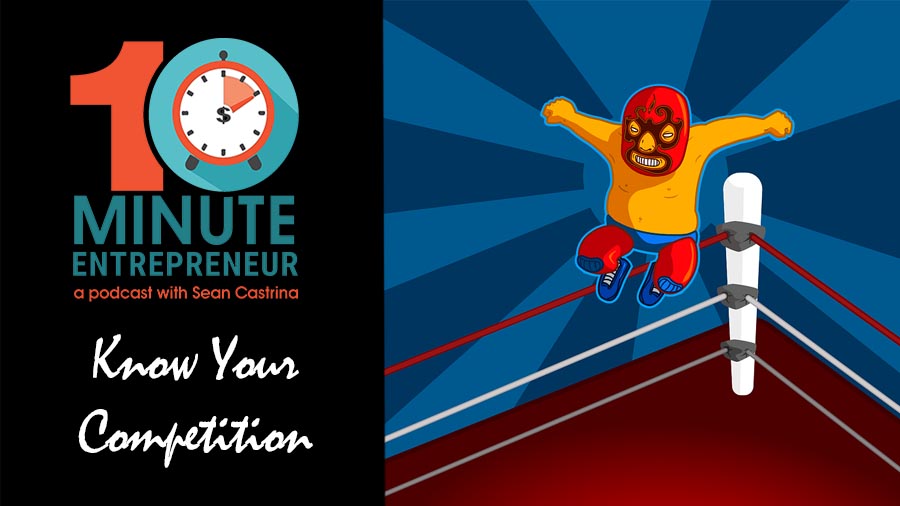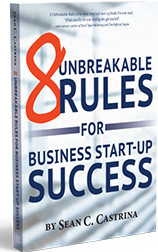What we’re talking about today is, why do you need to know your competition. That’s why I’m a fan of a business plan. Your study of your competition is a critical component, and there are two things I really want to know when I’m starting a business. I want to know my competition and my target customer. I don’t need to know the industry because I bring on partners who know that, but there are two things I want to know. I want to know who my competition is and I want to know who is most likely to buy what it is that we’re selling. I want it to be a plentiful market, and I want to know I can create a message to attract them. That’s a bonus.
Competiton Validates a Fertile Market
There’s a market that wants to buy what it is you’re selling. Do you know how I know that? People like buying hamburgers. McDonald’s, Burger King, Five Guys, In and Out. Clearly, there’s plenty of room for all of these companies. You can’t provide enough hamburgers because a new place opens up. Competition validates that you have proof of market and there are people that want to buy this.
We talk about the Blue Ocean; that means you have no competition. Yeah, but the other side of that is you have to believe that people will want with you what you’re going to sell, but it’s far riskier.
Sometimes the timing is just not right. You may have a great something great, but the timing just isn’t right for that. But if you got competitors out there and they’re selling it, then you have validation. There is a market for it. Why do I know that? Because there are other people selling it and they’re in business.
I personally have never looked for a Blue Ocean. Maybe my brain is not smart enough to find it, I don’t know, but I like to find competitors. Now, I don’t want complete saturation. There’s a difference between competition and saturation.
Competition Helps You Price
I can look at what they’re offering in relation to what I’m offering and I can price it accordingly. Maybe needs to be under it, maybe it needs to be over it, or maybe I package my product or service with a few different things to increase the value. Maybe mine has higher quality, maybe mine doesn’t, but I have a standard with which to compare.
Competition Helps Create an Attractive USP
Your Unique Selling Proposition is why somebody’s going to buy from you. Based on your competition’s business, can create a pitch that blow’s theirs away.
An example of that would be like Tommy John underwear.
There used to be not a great variety in underwear. It was boxers, briefs, and boxer-briefs. Then along comes Tommy John. Before you would buy three pairs for $6.99 to $9.99. Tommy John came along and said we’re gonna sell you 1 pair of our underwear for $32.99. It’s got this incredible waste band. We’ve got this flex technology, etc.
They put together a unique selling propostion that nobody else had.
What was Hanes’s selling proposition? Michael Jordan wears them. But that was it. And that was good. That was a great pitch.
But Tommy John came with no, listen, let’s really talk about why underwear isn’t that great. So they took what was out there, looked at the blueprint, all their competition, and they carved out a USP and a cute tag line. “No adjustment needed. The most comfortable underwear you will ever wear.”
Competition Creates an Enemy for Your Staff to Want to Overcome
I always do this. There’s always a villain in my startup story. Sometimes it’s the industry standard, how they’re doing something, and our pitches will lay claim to it.
Let me give you one simple example of how I create an enemy sometimes. It doesn’t have to be purely your competition. It could be the industry itself. You can pick something really big that’s kind of an industry-standard.
I remember I built an addition on my house, that’s one of the reasons why I started the home services company and expanded it to offer this service. When I signed the contract with the company, they took a third of my money. When they started, they got another third. That industry standard in the State of Virginia. Can you believe this? They can get 66% of the money before they ever took out a tool and built anything. When I designed my company, we would take a 10% deposit with the ability to get the money back, and if the design that we create doesn’t make you happy, we’ll give your money back as well. Then you only paid based on third-party inspections because typically projects need county permits and inspections.
I niched that out. This continues to make me millions. Why? I looked at the industry standard, which my competitors were doing, so I didn’t have to find just one. There are so many remodeling companies, there wasn’t really just one to pick, so I picked the industry standard which my competitors were following. I told customers that this is what typically happens with companies. You’re going to give a third deposit and then you’re going to give a third when they start so that’s two-thirds of the money up. You’re basically a hostage at that point.
It was an easy pitch, and let’s turn our company into the most popular remodeling company in our area.
Competition Provides a Contrast
I create the contrast between my company and the competition, such as the buying experience. What about our company is different? We have on-staff designers, knowledgeable folks to answer your phone call. We don’t use subcontractors, etc.
I created contrasts with my direct mail magazine. We put cute kids on the cover, not pizza pies. What do I tell my advertisers? They were my customers. We mailed them to people, but what I told them, is when people get something in the mail and there’s a big ad on the front of it, they throw it away. Nine out of 10 times, they throw it away. But they don’t throw away magazines with a cute kid on the cover. Nobody throws that away. Great marketing needs a villain, a target, or a contrast. I like doing contrasts.
Competition Can Be Used as a Measuring Stick
When I had direct mail magazine, it was Valpak. I wanted to crush them. And we did. When that envelope would come, I would open it up, see how many advertisers they had, compare it with what was in my magazine, and crush ’em, and I would share that. I would share that we had greater retention. I would take a magazine of ours and I’d put little red dots in the magazine for everybody that renewed for the next ad and 90% of my ads were filled.
So when I would go sell, this is all I had to do was show potential advertisers that we had three spots available. These seasonal businesses aren’t going to advertise right now, but you can see my other 63 out of 66 advertisers are in. How powerful is that visual? So I use my competition as a measuring stick.
Competition Can Be Used to Carve Out a Niche
Can you carve out a niche that makes you unique and how you do it? This is endless on how companies have done this. You look at a bigger industry and you kind of carve out something unique. Warby Parker did this with eyeglasses. You can try up to 5 different frames at home, for free. They’ve done it better than anybody and it’s not even close. So they don’t have to have any brick-and-mortar stores. Pearl Visions are in malls and shopping centers, paying rent. Warby Parker put all that money into an incredible online store and great buying process.


